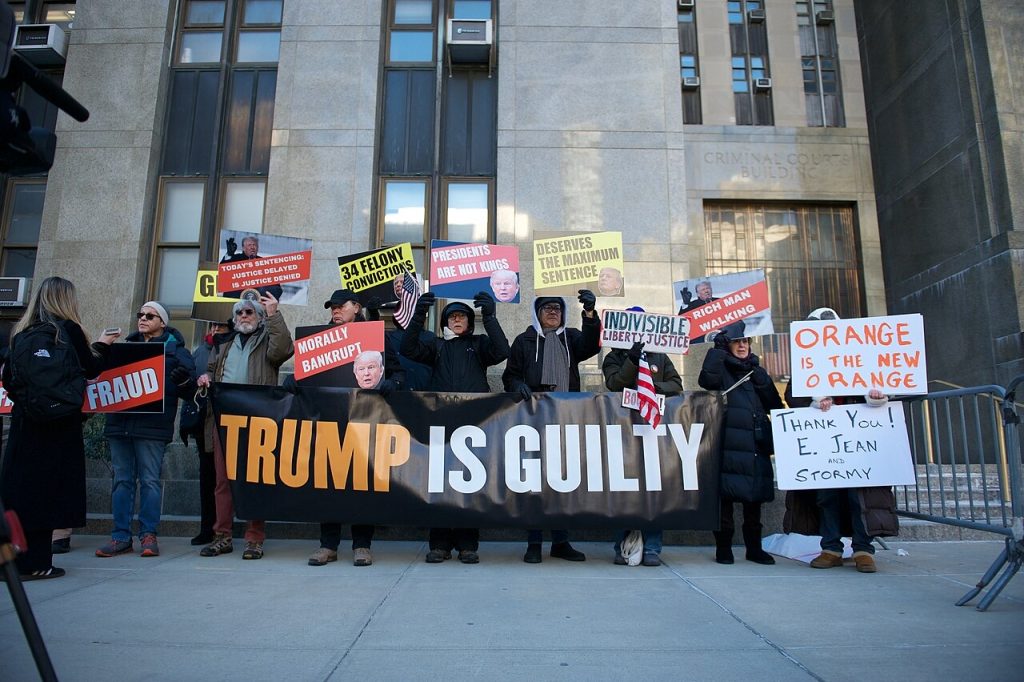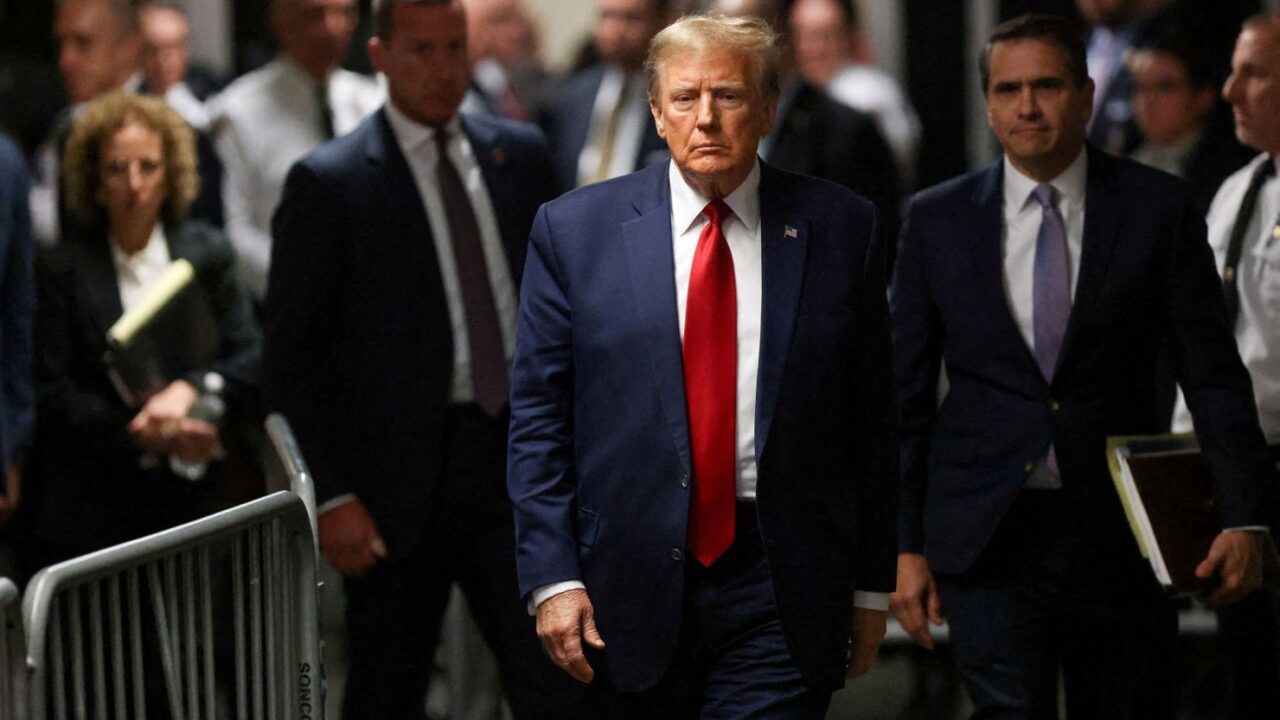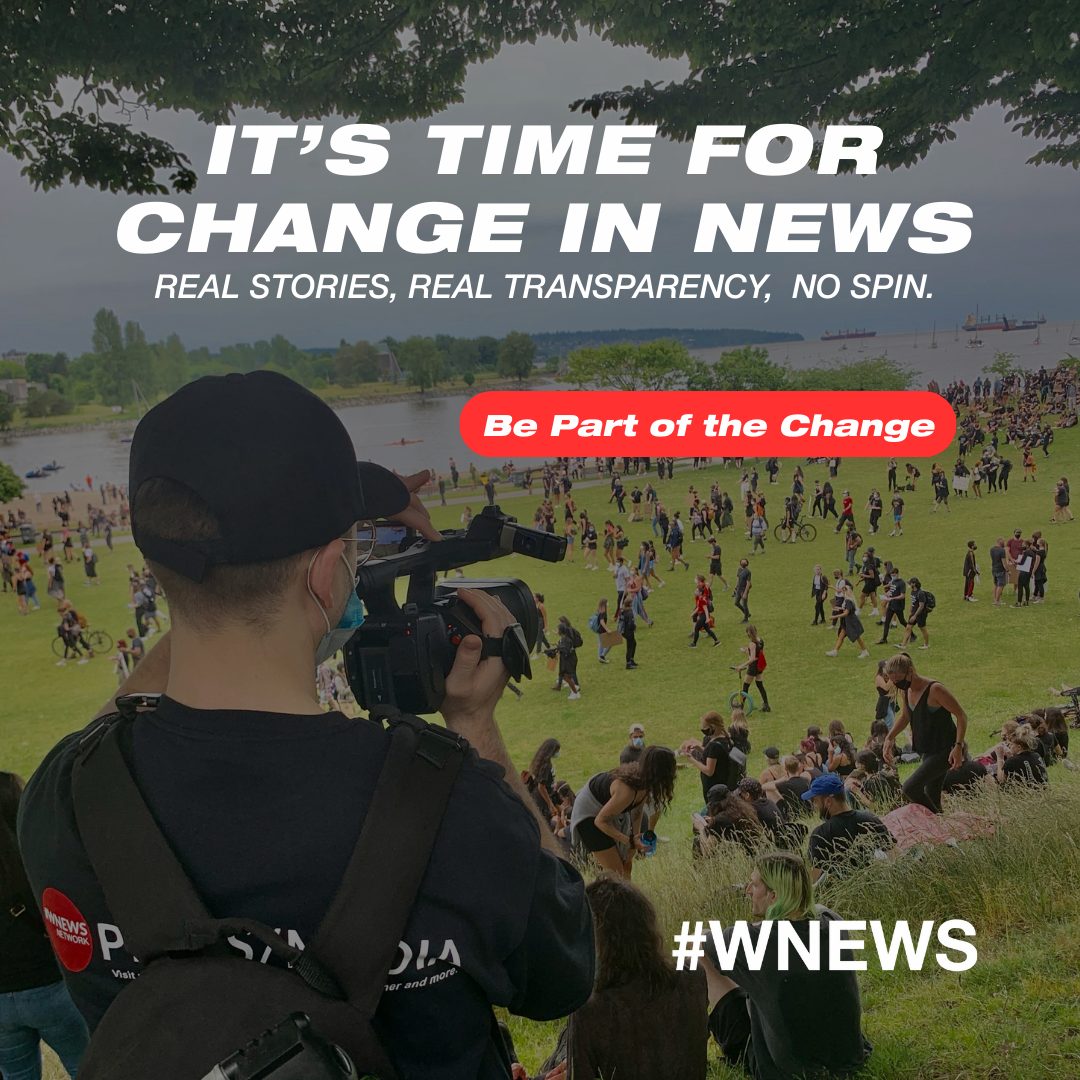- Donald Trump given Unconditional Discharge
- Trump was found Guilty of 34 counts of falsifying business records
- Trump plans to appeal the conviction
New York, New York, United States (WNEWS) – In an unprecedented legal proceeding, President-elect Donald Trump was sentenced early on Friday after being found guilty on 34 felony counts of falsifying business records. These charges were related to hush money payments made during his 2016 presidential campaign to cover up alleged extramarital affairs. Despite the seriousness of the convictions, Judge Juan Merchan issued an “unconditional discharge,” which means Trump will not be required to serve any jail time, pay fines, or undergo probation.
Unconditional Discharge: A Legal Anomaly
An unconditional discharge is a legal outcome where a defendant is found guilty but is not subjected to any form of punishment. This rare sentencing decision is typically reserved for cases where imposing a penalty serves no meaningful purpose. In Trump’s case, Judge Merchan cited the impracticality of incarcerating a president-elect and the necessity to conclude the legal proceedings before his inauguration on January 20.
The Convictions: A Brief Overview
The origins of this case can be traced back to the 2016 presidential election. During that election, Trump’s former attorney, Michael Cohen, made payments totaling $130,000 to adult film actress Stormy Daniels. These payments were intended to conceal an alleged affair between Trump and Daniels, thereby safeguarding his campaign from potential scandal. Later, Trump reimbursed Cohen for these expenses, which were recorded as legal expenses in the financial records of the Trump Organization.

In 2018, Cohen pleaded guilty to multiple charges, including campaign finance violations, and confessed that the payments were made at Trump’s behest to influence the election’s outcome. This admission sparked further investigations into the Trump Organization’s financial dealings and the veracity of its business records.
Trump Legal Proceedings and Trial
The Manhattan District Attorney’s Office, headed by Alvin Bragg, pursued a case against Trump, alleging that he falsified business records to conceal the true nature of the payments made to Daniels. In March 2023, a Manhattan grand jury indicted Trump on 34 felony counts of first-degree falsifying business records. The trial commenced on April 15, 2024, with the prosecution presenting evidence suggesting that the payments were part of an illegal scheme aimed at influencing the 2016 election by suppressing negative information.
The defense argued that Trump was unaware of any unlawful scheme and asserted that Cohen acted independently. However, the prosecution’s case was strengthened by testimonies from multiple witnesses, including financial experts and individuals directly involved in the transactions. On May 30, 2024, the jury found Trump guilty on all 34 counts, making it the first time a former U.S. president was convicted of a felony.
What Is an Unconditional Discharge?
An unconditional discharge is a rare legal outcome in which a defendant is found guilty of a crime but is not subjected to any form of punishment, such as imprisonment, fines, or probation. While the conviction remains on the defendant’s record, the lack of punitive measures signifies that the court has chosen not to impose any consequences for the offense.
This type of sentencing is generally reserved for cases where the court determines that imposing penalties would serve no practical or rehabilitative purpose. It can also be used in situations where punishment could create significant complications, such as constitutional crises or disproportionate consequences relative to the offense.
In the U.S. legal system, an unconditional discharge is a less common outcome compared to its counterpart, the conditional discharge, which requires the defendant to meet specific criteria, such as good behavior or participation in community service, to avoid further penalties.
Why Was Trump Given an Unconditional Discharge?
In the case of President-elect Donald Trump, Judge Juan Merchan opted for an unconditional discharge due to the extraordinary circumstances surrounding the situation. Several factors influenced this decision:
- Logistical and Constitutional Challenges: As president-elect, Trump’s incarceration or probation could have created logistical and constitutional dilemmas. The judiciary recognized the potential for this to disrupt the peaceful transition of power and create a constitutional crisis.
- Practicality Over Punishment: Judge Merchan likely considered that imposing penalties would serve little purpose given Trump’s unique status and the impracticality of enforcing them against a president-elect. For example, imprisonment could have raised questions about national security and the ability of the president-elect to perform his duties.
- Expediting the Legal Process: By issuing an unconditional discharge, the court effectively brought the legal proceedings to a conclusion before Trump’s inauguration. This avoided prolonged legal battles that could have further polarized the nation and disrupted the political landscape.
Criticism of the Unconditional Discharge
The decision to issue an unconditional discharge has sparked considerable debate. Critics argue that it undermines the principle of equality before the law, creating the perception that powerful individuals are exempt from accountability. They also worry that this outcome could set a dangerous precedent, allowing future public officials to evade punishment for wrongdoing under the guise of logistical challenges or political expediency.
On the other hand, proponents of the decision contend that the court acted pragmatically, balancing the need for justice with the unique demands of the presidency. They argue that this outcome preserves stability and prevents further disruption to the nation’s governance.
How Does It Compare to Other Sentencing Options?
An unconditional discharge stands in stark contrast to other common sentencing outcomes:
- Incarceration: The defendant is sentenced to jail or prison for a set period.
- Probation: The defendant avoids imprisonment but must comply with specific conditions, such as reporting to a probation officer or abstaining from criminal activity.
- Fines: The defendant is ordered to pay a monetary penalty.
- Conditional Discharge: The defendant avoids punishment but must meet certain conditions, such as completing a rehabilitation program or avoiding further legal issues for a set period.
By choosing an unconditional discharge, the court bypassed all these options, opting instead for a resolution that acknowledges Trump’s guilt without imposing further consequences.
This sentencing decision has ignited significant discussions about how the legal system balances justice, accountability, and practical considerations, especially in cases involving individuals in positions of immense power.
Reactions and Implications
The sentencing has elicited a spectrum of reactions. Critics argue that the unconditional discharge undermines the rule of law, suggesting that it sets a precedent where individuals in positions of power are not held accountable for their actions. They contend that the absence of tangible consequences could erode public trust in the judicial system.
Conversely, supporters of Trump view the sentencing as a politically motivated attempt to tarnish his reputation before he reassumes the presidency. They argue that the legal proceedings were a “witch hunt” designed to undermine his political standing.
The decision to hand Trump an unconditional discharge reverberates far beyond the confines of the Manhattan courtroom. Legal scholars, political analysts, and the public are grappling with the long-term implications of this unprecedented outcome. At the heart of the matter is a critical question: What message does this sentencing send about accountability for individuals in positions of immense power?
International observers are closely watching the fallout from Trump’s sentencing. The case has raised questions about how the U.S. legal and political systems handle accountability at the highest levels of government. For allies, the proceedings underscore the resilience of democratic institutions, even in the face of unprecedented challenges. For adversaries, the case may be portrayed as evidence of instability and division within the United States.
The global implications extend beyond perceptions of the U.S. justice system. As Trump prepares to reassume the presidency, his legal controversies may influence his foreign policy decisions, particularly in dealings with nations that have criticized his administration in the past. Additionally, the case could embolden leaders in other countries who face legal challenges of their own, providing a precedent for avoiding punitive measures.
Legal Community Perspectives
Legal experts are divided on the implications of the unconditional discharge. Some assert that the decision was pragmatic, considering the logistical challenges of incarcerating a president-elect and the potential constitutional crises it could provoke. Others believe that a conviction without punishment diminishes the deterrent effect of the legal system and may embolden future misconduct by public officials.
While the unconditional discharge may mark the end of this particular chapter, Trump’s legal troubles are far from over. His team has already filed appeals to overturn the felony convictions, and additional investigations into his financial dealings, political activities, and handling of classified documents continue to loom.
Moreover, this case has spurred discussions about potential reforms to address legal proceedings involving sitting presidents or president-elects. Some have called for clearer guidelines on how to handle such cases to avoid perceptions of partisanship or undue leniency. Others suggest revisiting laws governing campaign finance violations, arguing that stricter enforcement is necessary to prevent future abuses.
The principle of equal justice under the law is a cornerstone of democratic societies. However, the unique circumstances surrounding Trump’s case have reignited debates about whether political figures operate under a different set of rules. While Judge Juan Merchan emphasized the logistical and constitutional challenges of imposing a harsher sentence on a sitting president-elect, critics argue that the lack of tangible consequences creates a perception of a double standard.
Legal experts have noted that the unconditional discharge could set a concerning precedent for future cases involving high-ranking officials. If individuals in powerful positions are seen as immune to punishment, it may erode public trust in the judiciary and embolden others to act with impunity. On the other hand, some argue that the decision reflects judicial restraint, avoiding further polarization in an already deeply divided nation.
Trump’s Response and Future Actions
In response to the sentencing, Trump has maintained his stance of denying any wrongdoing, labeling the case a “tremendous setback” and a “political witch hunt.” His legal team has announced plans to appeal the conviction, seeking to overturn the verdict and clear his name before his inauguration.
In a post published on TruthSocial, Trump called the sentencing an “unAmerican Witch Hunt” and specifically criticized the waste of millions of dollars on the case while acknowledging the rampant crime that has plagued New York City.
The Radical Democrats have lost another pathetic, unAmerican Witch Hunt. After spending tens of millions of dollars, wasting over 6 years of obsessive work that should have been spent on protecting New Yorkers from violent, rampant crime that is destroying the City and State, coordinating with the Biden/Harris Department of Injustice in lawless Weaponization, and bringing completely baseless, illegal, and fake charges against your 45th and 47th President, ME, I was given an UNCONDITIONAL DISCHARGE. That result alone proves that, as all Legal Scholars and Experts have said, THERE IS NO CASE, THERE WAS NEVER A CASE, and this whole Scam fully deserves to be DISMISSED. The real Jury, the American People, have spoken, by Re-Electing me with an overwhelming MANDATE in one of the most consequential Elections in History. As the American People have seen, this “case” had no crime, no damages, no proof, no facts, no Law, only a highly conflicted Judge, a star witness who is a disbarred, disgraced, serial perjurer, and criminal Election Interference. Today’s event was a despicable charade, and now that it is over, we will appeal this Hoax, which has no merit, and restore the trust of Americans in our once great System of Justice. MAKE AMERICA GREAT AGAIN!’ – President Elect Donald Trump | TruthSocial (@realdonaldtrump)
Historical Context and Precedents
This case marks the first instance of a U.S. president-elect being convicted of a felony. The unprecedented nature of the situation has prompted discussions about the legal system’s capacity to hold high-ranking officials accountable and the potential need for reforms to address such unique circumstances in the future.
Public Opinion and Political Ramifications

Public opinion remains deeply divided along partisan lines. Some citizens express concern that the lack of punitive measures could signal a double standard in the justice system, while others believe that the legal actions against Trump were unjustified and politically driven. The sentencing is expected to have significant implications for the political climate, potentially influencing voter sentiment and legislative priorities in the coming term.
The sentencing of President-elect Donald Trump to an unconditional discharge following his felony convictions represents a complex intersection of law, politics, and public perception. As Trump prepares to assume the presidency, the ramifications of this legal outcome will likely continue to unfold, prompting ongoing debate about accountability, justice, and the resilience of democratic institutions.
The political implications of Trump’s sentencing are profound. As he prepares to reenter the White House, Trump’s status as the first U.S. president to be convicted of a felony will undoubtedly shape his presidency. For his supporters, this legal ordeal may reinforce his image as a political outsider who has been unfairly targeted. Trump has already begun using the case to galvanize his base, framing himself as a champion of the people who refuses to be silenced.
However, the legal proceedings may also energize his opposition. Democrats and progressive organizations are likely to use the convictions as evidence of Trump’s unsuitability for office, potentially mobilizing voters ahead of the 2026 midterms. The sentencing has also reignited debates within the Republican Party, with moderate factions questioning whether Trump’s leadership is worth the controversies it brings.










